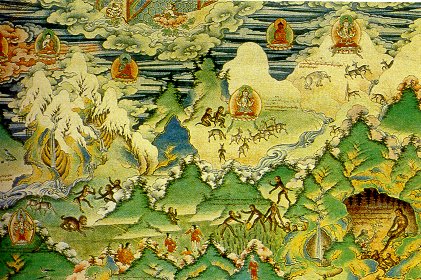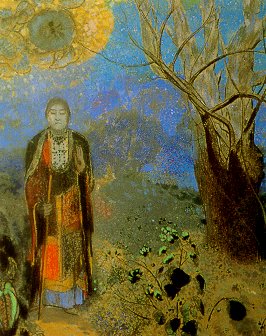
| Contents
97.2 Difficulty in the faith/belief 97.3 The Necessity of Buddha Recitation 97.4 Expedient Teaching or Wonderful Dharma People may have many, many doubts or questions on the faith of Amitabha Buddha and his Pure Lands, for instance, 'Where is Sukhavati?', 'Does it physically exist?' According to the Amitabha Sutra, "Beyond a hundred thousand Kotis of Buddhalands westwards from here, there is a world named Sukhavati." There seems no reason to doubt the existence of another world on a higher plane than ours. Occult signs are not so easy to be verified as those of material science. However, due to the subjective assumptions in material science and physical limitations of human beings, one cannot deny the existence of what the material science cannot verify. This is a really fair and reasonable attitude and right scientific approach in the interpretation of occult phenomena. However, some people maintain a stubbornly incredulous attitude towards Pure Land Buddhism, and even slander it. It is most unfortunate for those who by their irrational arrogance entirely oppose their deepest interest, obstruct them to the path to the Pure Land.
97.2 Difficulty in the faith/belief It is always said that Pure Land Buddhism is easy to practice and achieve enlightenment, but difficult to explain and hard to believe. When Shakyamuni Buddha preached the Amitabha Sutra, he was aware that sentient beings in the Dharma-ending age would have difficulty believing Pure Land teachings. He therefore quoted the earnest and sincere words of all other Buddhas so as to dispel their doubts and develop their faith. Generally, one's belief is based on one's experience and knowledge. Our mind consciousness, i.e. the sixth consciousness performs immediately the function of recognition and differentiation, based on the past experience and knowledge through:
Generally, the majority of our belief is based on the third one because most of our knowledge, like history and geography, is obtained from the books, TV and other multi-media, the words of other people, etc. With respect to Pure Land Buddhism, Shakyamuni Buddha quoted the earnest and sincere words of other Buddhas in the six directions in preaching the Amitabha Buddha, as follows: "Shariputra, as I now glorify the inconceivable excellences of Amitayus Buddha, there are also in the Eastern quarters Buddha Akshobhya, Buddha Merudhvaja, Buddha Mahameru, Buddha Meruprabhasa, Buddha Manjughosha, and Buddhas as many as the sands of the River Ganga, each of whom, in his own country stretching out his long broad tongue that covers three thousand greater worlds completely, proclaims these truthful words; All you sentient beings believe in this Sutra, which is approved and protected by all the Buddhas, and in which are glorified the inconceivable excellences (of Buddha Amitayus)." Similarly, "... in the Southern worlds there are Buddha Candrasuryapradipa, Buddha Yacahprabha, Buddha Maharciskandha, Buddha Merupradipa, Buddha Anantavirya, and Buddhas as many as the sands of the River Ganga,..." And, "... in the Western worlds there are Buddha Amitayus, Buddha Amitalakshana, Buddha Amitadhvaja, Buddha Mahaprabha, Buddha Mahanirbhasa, Buddha Ratnala kshana, Buddha Shuddharashmiprabha, and Buddhas as many as the sands of the River Ganga,..." And,"... in the Northern worlds there are Buddha Arciskandha, Buddha Vaishvanaranirghosha, Buddha Dushpradharsha, Buddha Adityasambhava, Buddha Jaliniprabha, and Buddhas as many as the sands of the River Ganga,..." And," ...in the Nadir worlds there are Buddha Simha, Buddha Yacas, Buddha Yashaprabhava, Buddha Dharma, Buddha Dharmadhvaja, Buddha Dharmadhara, and Buddhas as many as the sands of the River Ganga..." And, "... in the Zenith worlds there are Buddha Brahmaghosha, Buddha Nakshatraraja, Buddha Gandhottama, Buddha Gandhaprabhasa, Buddha Maharciskandha, Buddha Ratnakusumasampushpitagatra, Buddha Salendraraja, Buddha Ratnotpalashri, Buddha Sarvarthadarsha, Buddha Sumerukalpa, and Buddhas as many as the sands of the River Ganges..." Moreover, one may find that there are many Pure Land literatures recording the stories of the rebirth of the great masters and the Pure Land devotees. It is witnessed by their followers how they practice Pure Land teachings, the auspicious signs during practicing and at the moment of their death, the experience in Pure Land, etc., so as to develop their faith. What is described in Pure Land teaching is certainly inconceivable to the ordinary minds of human beings on Earth. That is why Pure Land Buddhism is a religion of faith. However, it is not blind faith, but a process of developing different levels of faith through practices:
97.3 The Necessity of Buddha Recitation Again, a critic may ask:
"Why should the privilege of being born in that Buddha-country
depend on repeating the name of that Buddha? Is good Karma alone
not sufficient to cause one's re-birth?" The realization of any matter or existence is effected by Karma [業] and by Vijnapti or consciousness [識] (i.e. the nucleus or the spiritual seeds of sensate knowledge or empirical mind), just as it is the nebula, which forms the universe. The various phenomena or creatures of the world are produced by hair-splitting and the discriminated desire of beings. So, Karma and Vijnapti both are the dynamic of rebirth in Pure Land or any other world. Their maturity may occur in different times depending on the bias of either or these two elements. Meditating on Buddha (or reciting His Name) is to strengthen the Vijnapti to sublimate it to its highest purification. The accumulation of a stock of merit certainly will be the foundation of the cause of rebirth, but sometimes the Vijnapti is also very strong, if it precedes the other (the Karma). For instance, for a pious follower of the Pure Land doctrine, if he changes his mind or gets into violent anger at the end of his life, he will fall into the evil realms of existence and be born as an animal of a malignant nature. However his good Karma resulting from faith in the good law (Dharma) still exits; sooner or later it will be matured, so that in spite of the evil realms he may pass through from life to life, yet at last he will be saved by his previous noble aspirations which ensure his birth in the Pure Land of Buddha-country. He who possesses a good stock of merit is still required to do the work of reciting the name of Buddha Amitabha. This is to prevent divergence from the right path, drawn by the Vijnapti. The heart of mankind is restlessly bringing about noble or evil thoughts from moment to moment. The thoughts are the seeds, which will have the fruition of a favorable or unfavorable life in the future. A single thought possesses the potentiality of producing one's existence in any of the tenfold Dharma-circle (the states of universal law), especially at the particular time when one is approaching death; at such a moment, it is necessary to repose his mind on the name of the great Savior. Therefore a deep impression of the Pure Land should be made beforehand, by meditating on the Buddha or repeating the name of Amitabha Buddha, whose power saves one from falling into wrong ways of rebirth The power and virtue of the Buddha are as vast as the ocean, while the power of earthly beings in comparison to the Buddha is very weak. But if one's aspiration is joined to the Buddha's glory, it is like a drop of water embodied in the sea and is thus sufficient to stand against any stream. 97.4 Expedient Teaching or Wonderful Dharma Master Yung Ming, who received the Direct Transmission Dharma in the lineage of Fa Yen branches, one of the Five Branches of Chan in Chinese Buddhism, wrote the famous lines in his commentary: "With Chan, but without Pure Land, nine out of ten seekers of the Way take the wrong route. Without Chan but with Pure Land, of ten thousand who practice, ten thousand reach the Pure Land.." Though the basic goal of Pure Land Buddhism is the rebirth in Pure Land, not really the attainment of Buddhahood, the Dharma of Pure Land is not merely an expedient teaching. It is also a wonderful Dharma. Out of many expedient ways leading to the end of the cycle of birth and death, Pure Land Buddhism is a shortcut. It is not limited to those with shallow roots as this Dharma can convert people of all three levels, superior, mediocre and inferior. Bodhisattva Samantabhadra who encompasses the whole Dharma Realm with his Dharma Body makes Ten Great Vows directed to the Pure Land. An ancient master demonstrated, with reference to the Tripitaka, that to point to the Mind is to return to the Pure Land. Dharma of Pure Land was preached by Shakyamuni Buddha, of his own accord, without being requested [無問自說], and is extolled by all Buddhas throughout the ten directions. |




